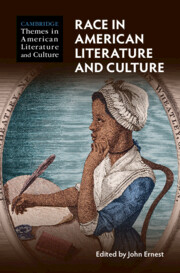Book contents
- Race in American Literature and Culture
- Cambridge Themes in American Literature and Culture
- Race in American Literature and Culture
- Copyright page
- Contents
- Contributors
- Acknowledgments
- Introduction
- Part I Fractured Foundations
- Part II Racial Citizenship
- Part III Contending Forces
- Part IV Reconfigurations
- Part V Envisioning Race
- Part VI Case Studies
- Part VII Reflections and Prospects
- Chapter 24 What Is Missing?
- Chapter 25 Traditions, Communities, Literature
- Chapter 26 Children of the Future
- Chapter 27 Presidential Race
- Index
Chapter 27 - Presidential Race
from Part VII - Reflections and Prospects
Published online by Cambridge University Press: 26 May 2022
- Race in American Literature and Culture
- Cambridge Themes in American Literature and Culture
- Race in American Literature and Culture
- Copyright page
- Contents
- Contributors
- Acknowledgments
- Introduction
- Part I Fractured Foundations
- Part II Racial Citizenship
- Part III Contending Forces
- Part IV Reconfigurations
- Part V Envisioning Race
- Part VI Case Studies
- Part VII Reflections and Prospects
- Chapter 24 What Is Missing?
- Chapter 25 Traditions, Communities, Literature
- Chapter 26 Children of the Future
- Chapter 27 Presidential Race
- Index
Summary
The works of George Saunders and J.D. Vance suggest two paths forward for white American writers in the twenty-first century. While both acknowledge whiteness as foundational to the organization of contemporary society, Vance ignores the privileges that Saunders seeks to interrogate. The elections of both Obama and Trump have profoundly shifted how we talk about race in the United States, and their presidencies have made clear that whiteness can no longer operate as an invisible, presumed position of authority. Amid our often frightening moment of political unrest, we have an opportunity to speak of whiteness as the historical force of domination and exclusion that led to centuries of injustice and which continues to define so much of contemporary American life. Though white writers have not led the way on progressive representations of race in U.S. fiction, they may at last complete the important task of making whiteness visible.
- Type
- Chapter
- Information
- Race in American Literature and Culture , pp. 428 - 436Publisher: Cambridge University PressPrint publication year: 2022

